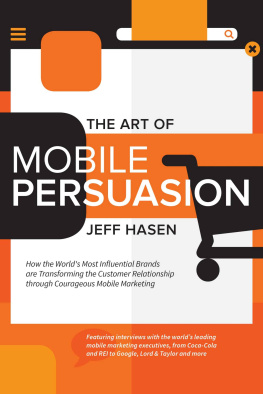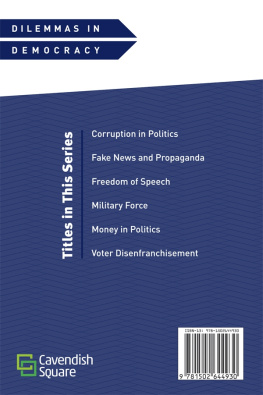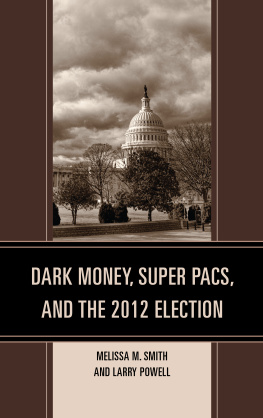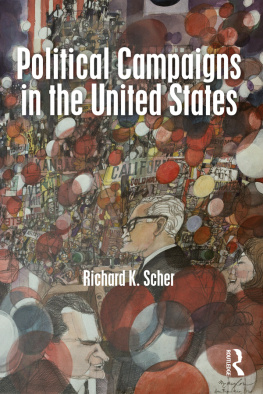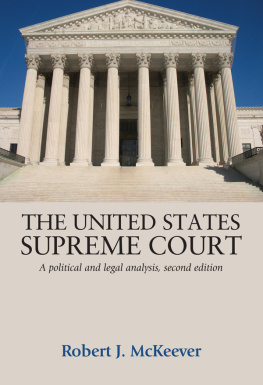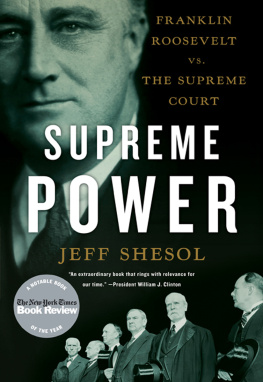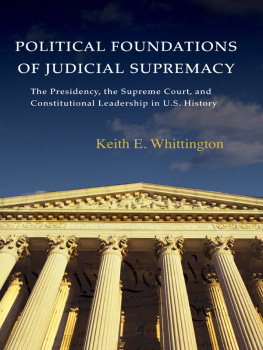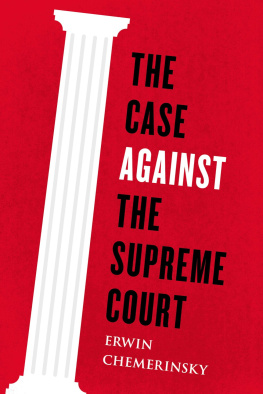PLUTOCRATS UNITED
RICHARD L.HASEN
Plutocrats United
CAMPAIGN MONEY, THE SUPREME COURT, AND THE DISTORTION OF AMERICAN ELECTIONS

Copyright 2016 by Richard L. Hasen.
All rights reserved.
This book may not be reproduced, in whole or in part, including illustrations, in any form (beyond that copying permitted by Sections 107 and 108 of the U.S. Copyright Law and except by reviewers for the public press), without written permission from the publishers.
Yale University Press books may be purchased in quantity for educational, business, or promotional use. For information, please e-mail (U.K. office).
Set in Scala type by Integrated Publishing Solutions,
Grand Rapids, Michigan.
Printed in the United States of America.
ISBN 978-0-300-21245-7 (cloth : alk. paper)
Library of Congress Control Number: 2015940942
A catalogue record for this book is available from the British Library.
This paper meets the requirements of ANSI / NISO Z 39.48-1992
(Permanence of Paper).
10 9 8 7 6 5 4 3 2 1
For Lori,
a life partner whose love, wisdom, beauty, and support
are far more than I could have imagined or deserve
CONTENTS
ACKNOWLEDGMENTS
I have been thinking and writing about campaign finance law and policy for more than twenty years. This book is a culmination of my work in this area, but I see it as more of a collaborative effort. My scholarship has been possible only because of how much I have learned from others in the field who came before me and from those who write in dialogue on these issues. I cite and discuss many of my fine colleagues work in this book.
Bob Bauer, Bruce Cain, Erwin Chemerinsky, Yasmin Dawood, David Ettinger, Ned Foley, Paul Horwitz, Steve Kay, Sarah Lawsky, Tom Mann, Ken Mayer, Bob Mutch, Jake Rowbottom, John Sides, Nick Stephanopolous, Marty Wattenberg, Sonja West, and Adam Winkler read and provided detailed comments on significant portions of the manuscript. Others read portions of the manuscript or provided important information or feedback, including: Tim Bartlett, Keith Ewing, Dave McBride, Jeff Milyo, Nate Persily, Rick Pildes, Chris Rhodes, and Irit Samet.
A group of colleagues at the University of California, Irvine, read the manuscript and met to discuss it, providing me with wonderful feedback as the book was being written. Thanks to Erwin Chemerinsky, Sarah Lawsky, Jack Lerner, Greg Shaffer, Bob Solomon, Ann Southworth, and Colleen Taricani for stimulating conversations. I also learned a great deal from presenting a portion of this manuscript at talks or workshops at Bucknell, Cal Poly San Luis Obispo, Kings College, Oxford, UCLA, and at the Yale University Freedom of Expression Scholars Conference.
Law students Emily Cross and Tara Schonhoff provided exemplary research assistance, and Emily (whose work on this project was probably much more than she thought she was signing up for) was joined by Justin ONeill for meticulous cite-checking work and Nassim Alisobhani and Francis Yao for proofreading. UC Irvines law librarians Betty Lim, Jessica Pierucci, Dianna Sahhar, and Christina Tsou were indispensable in assisting me with my arcane research queries, joined by Annette Buckley of the business school library when research took me into the world of potato chip marketing. Erwin Chemerinsky, dean of the UC Irvine School of Law, generously supported my scholarship. Robert Medeiros and Stacy Tran provided cheerful and professional administrative support.
Bill Frucht at Yale University Press made this a considerably better book. Aside from being an excellent editor and pushing me on my arguments, he has remarkably good judgment and instincts. Jaya Chatterjee of the Press graciously eased the way for my manuscript to sail through the many stages of review and editing, and Phil King helped my prose flow more effortlessly. I have been lucky to have the wise counsel of my agent, John Wright, a person of uncommon integrity, good sense, and smarts.
Finally, I owe a great debt to my wife, Lori. Her support, encouragement, and love made this bookand all I dopossible; this book is dedicated to her.
In the course of writing this book, I relied upon some of my earlier writings on related topics. I reprint with permission, in somewhat altered from, material appearing originally in the following publications:
Citizens United and the Illusion of Coherence, 109 Mich. L. Rev. 581 (2011)
End of the Dialogue? Political Polarization, the Supreme Court, and Congress, 86 S. Cal. L. Rev. 205 (2013)
Lobbying, Rent-Seeking, and the Constitution, 64 Stan. L. Rev. 191 (2012)
The Nine Lives of Buckley v. Valeo in First Amendment Stories (Richard Garnett & Andrew Koppelman eds., 2012)
Campaign Finance Laws and the Rupert Murdoch Problem, 77 Tex. L. Rev. 1627 (1999)
Three Wrong Progressive Approaches (and One Right One) to Campaign Finance Reform, 8 Harv. L. & Poly Rev. 21 (2014)
Introduction
A New American Plutocracy?
THE CHRIS CHRISTIE STORY WAS JUST TOO good for progressives to pass up, even though it obscured larger truths about the influence of money in American politics.
In the spring of 2014, a group of Republican presidential hopefuls, including Governor Christie of New Jersey, converged on the Venetian Hotel in Las Vegas to speak before the Republican Jewish Coalition and its key board member, the billionaire casino mogul and Venetian hotel owner Sheldon Adelson. It was a big moment for Christie, who was trying to get past a controversy over the closing of lanes on the George Washington Bridge allegedly in retaliation because Fort Lees mayor, a Democrat, did not support Christies reelection bid.
The speakers, the former Florida governor Jeb Bush, Ohio governor John Kasich, Wisconsin governor Scott Walker, and Christie, fell all over themselves to flatter Adelson and to announce their support for a continued strong relationship between the United States and Israel, Adelsons signature issue. Walker, according to a New York Times story, brought up his fathers trip to Israel, and said he puts a menorah candle next to his Christmas tree. The name of his son, Matthew, actually comes from Hebrew, he pointed out.
But Christie stepped in it. In his speech to the group, he warmly recalled a trip he took with his family to Israel, calling it an extraordinary personal experience. But he touched off disapproving whispers from the
Progressives denounced the line to kiss Sheldon Adelsons boots (or perhaps a bit higher up), the candidates prostrat[ing] themselves, seeking Adelsons stamp of approval and cash, and Christies apology to Adelson for describing the disputed regions with a term regularly used by U.S. presidents and the U.S. government.
Who could blame these candidates for participating in the Sheldon primary or for their obsequiousness? Adelson and his wife had contributed an astounding $98 million to $150 million (thanks to holes in our campaign disclosure laws we are not sure exactly how much) to help elect Republican candidates during the 2012 election, including giving more than $15 million to a Super PAC called Winning Our Future that seemed to single-handedly keep the former speaker of the House Newt Gingrich in the 2012 race for the Republican presidential nomination. The Adelsons later gave tens of millions more to support Mitt Romneys run against President Barack Obama in the general election. The 2016 presidential hopefuls wanted Adelsons support and, more importantly, his money.
Next page

